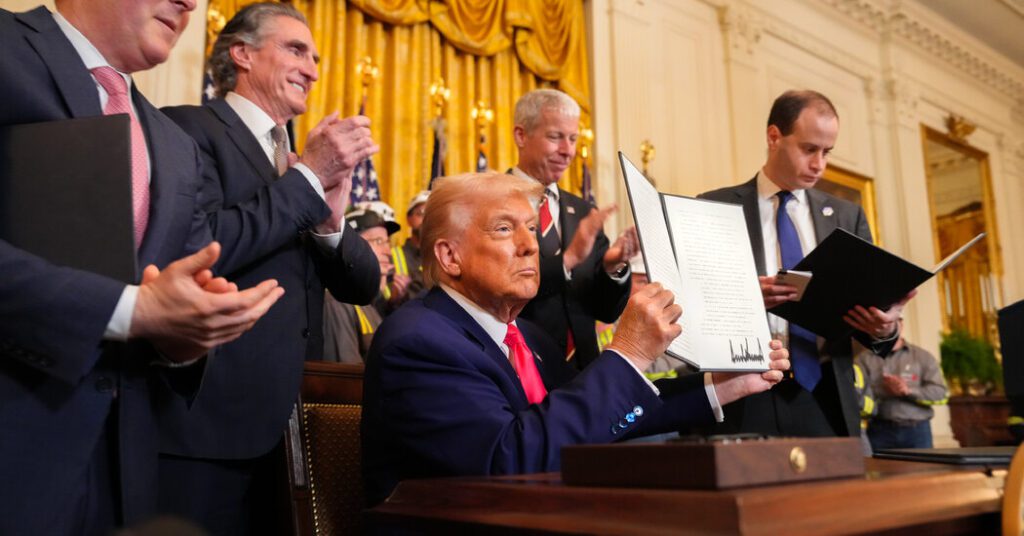Trump Signs Executive Orders to Revive Coal Industry
President Trump has taken significant steps to bolster the coal sector by signing a series of executive orders aimed at expanding coal mining and usage across the United States. This initiative is part of a broader effort to rejuvenate an industry that has faced considerable decline in recent years.
Key Measures Introduced
Among the executive orders, one instructs federal agencies to eliminate any regulations perceived as discriminatory against coal production. This includes:
- Opening up new federal lands for coal mining.
- Exploring coal utilization in powering new A.I. data centers.
- Waiving certain air-pollution restrictions imposed by the current administration on numerous coal plants facing closures.
Trump has also directed the Energy Department to devise a strategy using emergency powers to prevent the shutdown of economically unviable coal plants, a move likely to spark legal challenges. This approach mirrors his earlier attempts during his first term but faced considerable pushback, leading to its eventual abandonment.
Standing with Coal Miners
During a ceremony at the White House, flanked by coal miners, Trump emphasized the importance of restoring the coal industry, stating, “This is a very important day to me because we’re bringing back an industry that was abandoned despite the fact that it was the best, certainly the best in terms of power, real power.”
Coal’s Environmental Impact
Despite the support for coal, it faces substantial criticism due to its environmental effects. Coal combustion is the most polluting among fossil fuels, accounting for approximately 40% of the world’s industrial carbon dioxide emissions, contributing significantly to global warming and associated health hazards such as respiratory diseases and heart conditions. The byproducts of coal mining and combustion also pose environmental threats.
Trends in Energy Production
In recent years, coal usage in the U.S. has diminished sharply as energy companies pivot to alternative sources such as natural gas, wind, and solar. From nearly half of the nation’s electricity derived from coal in 2011, that number dropped to about 15% last year, with utilities closing numerous aging coal plants and announcing plans to retire many more.
Although Trump’s recent orders may lead to the extended operation of some coal-fired units, industry analysts remain skeptical about a full revitalization of the coal sector. “The main issue is that most of our coal plants are older and getting more expensive to run, and no one’s thinking about building new plants,” said Seth Feaster from the Institute for Energy Economics and Financial Analysis.
Future of the Coal Industry
Previous attempts to save unprofitable coal plants drew strong criticism from various sectors, including oil, gas, and consumer groups, warning that such measures would increase electricity costs for consumers. The potential for another round of these emergency powers remains, although it may be met with significant legal challenges this time.
During his first term, despite efforts to reverse regulations, the coal industry witnessed the closure of 75 plants and loss of around 13,000 jobs, continuing the trend under the Biden administration’s stricter environmental policies. As of this year, Trump has ordered the Environmental Protection Agency to repeal stringent regulations aimed at reducing coal emissions.
Industry Responses and Concerns
Executives within the energy sector are cautioning against rapid coal plant retirements, warning that it could heighten the risk of power shortages. Delays in bringing renewable energy online further complicate the situation. As Michelle Bloodworth, CEO of America’s Power, stated, “This complacency has led to damaging federal and state policies that have caused the premature retirement of coal plants, thus weakening our electric grid and threatening our national security.”
Conversely, environmental advocates argue that sustaining older coal plants could exacerbate pollution issues and drive up energy costs. Kit Kennedy, managing director for power at the Natural Resources Defense Council, commented, “Coal plants are old and dirty, uncompetitive and unreliable.”
In summary, while Trump’s executive orders may offer a lifeline to the coal industry, substantial challenges remain regarding environmental implications, aging infrastructure, and the ongoing transition towards cleaner energy sources.


